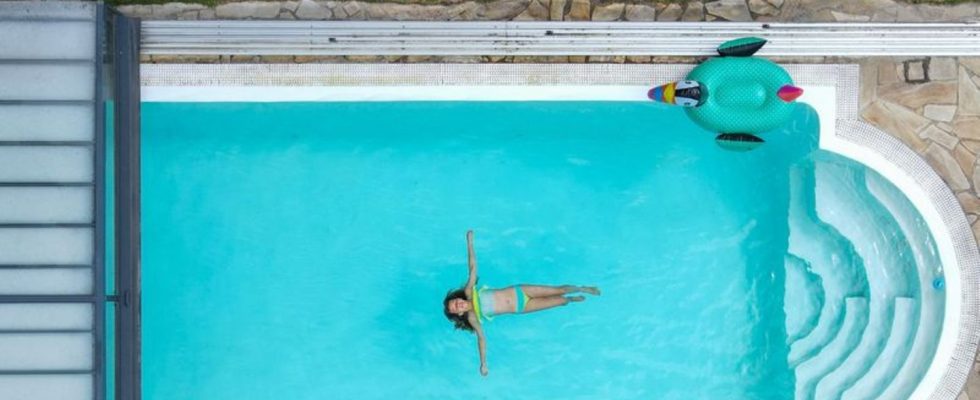When it’s hot, just go out in the garden and jump in the cold water? Pools are trendy. In view of the lack of water and climate change, this is not only met with enthusiasm.
In the summer months, many gardens are transformed into holiday oases. Then there are the above ground pools again. Children romp happily in the refreshing water, adults can float relaxed on air mattresses.
Splashing around in your own swimming pool has become a trend at least since the Corona pandemic. But in arid regions this is viewed increasingly critically. Given global warming and water shortage, is the private pool still viable?
In Bad Königshofen, the domestic bathing pleasure has been canceled for some time. The municipality is located in northern Bavaria, which regularly suffers from drought. “Precipitation has decreased significantly in recent years,” says Mayor Thomas Helbling. As a result, the drinking water supply reaches its limits in summer due to the low groundwater levels.
In the past five years, the municipality has therefore restricted consumption four times during the warm season: watering the garden, washing the car, blowing up sports fields and also filling pools is then prohibited. According to Helbling, it will be the same again this year.
According to the Federal Association of Swimming Pools & Wellness, there are 2.1 million private pools in Germany, two-thirds of which are above-ground pools or outdoor pools sunken into the ground. In view of 18 million homes, however, the association still sees great potential for growth. But can the water supply even do that?
Lawn sprinklers are also a problem
“Especially the garden irrigation and the filling of larger pools with tap water in the summer months can become a real problem,” says Bernd Düsterdiek from the German Association of Towns and Municipalities. “Even lawn sprinklers distribute up to 800 liters of drinking water in one hour.” The increased water consumption in summer could lead to bottlenecks in some places, so that local authorities would have to restrict use or issue bans. Almost 30 districts did this by means of general decrees last year.
In the municipality of Panketal on the outskirts of Berlin, people are also not allowed to water their gardens or fill pools at certain times from April to September. Like last year, this applies between 5 p.m. and 9 p.m., says Mayor Maximilian Wonke. Actually, this regulation should ensure that the waterworks is not overloaded at peak times. However, it has also led to an overall drop in water consumption, he says.
According to Wonke, the municipality has come up with something else: there is no basic fee for the water connection. Instead, everyone only pays for what they actually use. So if you let a large pool fill up, you have to dig deeper into your pocket. “We are curious to see whether this measure will also have an effect,” says Wonke.
Of course, the pools are not solely responsible for the increased water consumption on hot days. Then the demand of households will increase by 40 to 60 percent, says Martin Weyand from the Federal Association of Energy and Water Management (BDEW). But according to him, more and more people own a pool that swallows several thousand liters of water. “An average above ground pool with a diameter of 3.66 meters has a volume of 6500 liters. This corresponds to 52 times the daily requirement of a person.”
People’s efforts to save have softened
Since 2018, the Association of Municipal Companies (VKU) has been observing that people in Germany are consuming more water again. It represents more than 1,500 municipal companies that supply around 90 percent of all people in Germany with drinking water. According to preliminary calculations, last year consumption per person was 125 liters of water per day. In comparison: in 1990 it was still 147 liters, in 2013 it was only 121 liters.
According to VKU, the hot, dry summers and different leisure activities have softened the savings efforts: Especially during the corona pandemic, many people spent more time at home, got their garden in shape and built pools. That still has an effect today, because after all, the holiday oasis at home needs to be looked after.
Nevertheless, the VKU sees no reason for concern at the moment. “The worry lines are increasing, but we are well positioned in Germany,” says a spokesman. But you can’t lean back. The infrastructure has to be made fit for climate change and people have to be prepared to use water more carefully.
In Untereisesheim, Baden-Württemberg, a building ban on new swimming pools was even discussed for a short time. But in the end it didn’t come to that. “A structural ban on pool facilities is legally very difficult to maintain,” explains Mayor Christian Tretow. In addition, the administrative burden was very high. Instead, there should now be a general decree that prohibits the filling of pools in the event of a water shortage.
In Bremen’s allotment gardens, on the other hand, people are only allowed to hop into a paddling pool when it’s hot. According to the garden regulations, swimming and bathing pools have been illegal for many years, says Viola Falkenberg, chairwoman of the State Association of Garden Friends. Only paddling pools with a maximum diameter of two meters and a maximum height of half a meter are permitted.
Something similar is also planned in Hanover. According to the city, swimming pools are prohibited in the allotment gardens there, but so far above ground pools have not. But these are viewed critically, says city spokesman Dennis Dix. “All in all, the number of large pools has become overwhelming from the point of view of allotment gardens, often coupled with the sealing of the installation area that occurs in allotment gardens.” The allotment gardeners’ district association is expected to decide on a ban on above-ground pools in the fall.

